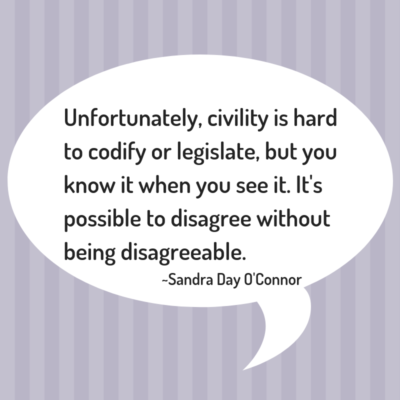Election Day is approaching, and I am reminded of an ongoing struggle I face as a teacher, the need for civil discourse.
The strife and anger expressed by political figures and everyday people on social media penetrates our communities at every level. Our politically divided society has far-reaching effects, and we teachers know that these effects manifest in our classrooms far too often.

I teach in a generally conservative community, which is also home to a large immigrant population. There is built-in conflict and a wide array of opinions, both well-informed and based on hearsay. Leading up to the presidential election two years ago, I was breaking up heated arguments in the halls of our junior high between 12-year olds. They didn’t fully understand the issues; they were parroting what their parents were saying, no doubt, but I remember being shocked, and deeply concerned. How did the political climate infiltrate our tiny, rural school?
Then, when the election was over, I was worried. I have behavior expectations around discussion and debate that require respect on all sides. I wondered if my students would still respect these ideals when their most admired figures did not adhere to respectful behavior or civil discourse. How can I have high expectations of my students when the adults around them were so far from civil? The whole world seemed full of terrible examples of uncivil behavior, and this continues today in the extreme, with bombings, shootings, hate crimes, and blatant hate-mongering on social media.
Although it seems like a monumental task, it is still our responsibility as teachers to instruct the key skills that can combat all of this incivility. If we intentionally instruct and model civil discourse, we can help our students build a better future.
 Civil discourse is the engagement in conversation to enhance understanding. It requires respect for all others involved, without judgment. You cannot conduct civil discourse if it is obvious that you question the good sense of your peers. You cannot conduct yourself with hostility, sarcasm, mockery, or excess persuasive language. You have to accept the views of others as valid, despite your disagreement.
Civil discourse is the engagement in conversation to enhance understanding. It requires respect for all others involved, without judgment. You cannot conduct civil discourse if it is obvious that you question the good sense of your peers. You cannot conduct yourself with hostility, sarcasm, mockery, or excess persuasive language. You have to accept the views of others as valid, despite your disagreement.
Now take a moment to imagine what that looks like in a junior high classroom. How about a high school debate? Conversation over Thanksgiving dinner with the extended family? Interactions on social media? A political debate? What if civil discourse was the norm?
The Common Core and Washington State Language Arts Standards are explicit in the requirements for discussion and communication:
“To become college and career ready, students must have ample opportunities to take part in a variety of rich, structured conversations—as part of a whole class, in small groups, and with a partner—built around important content in various domains. They must be able to contribute appropriately to these conversations, to make comparisons and contrasts, and to analyze and synthesize a multitude of ideas in accordance with the standards of evidence appropriate to a particular discipline. Whatever their intended major or profession, high school graduates will depend heavily on their ability to listen attentively to others so that they are able to build on others’ meritorious ideas while expressing their own clearly and persuasively.”
 As teachers, the urge to stay out of it, to be apolitical and neutral is strong. We don’t want to offend our students, their families, or our communities. However, we must model that we all have views and ideas, and how we express them is important. We do not force our views on others, but, instead, we invite discourse. Our students need to learn to share their ideas and listen to their peers. They need to understand the importance of researching the issues and verifying their sources. They need to practice protocols of debate and dialogue that guide them to be supportive listeners, even when they disagree.
As teachers, the urge to stay out of it, to be apolitical and neutral is strong. We don’t want to offend our students, their families, or our communities. However, we must model that we all have views and ideas, and how we express them is important. We do not force our views on others, but, instead, we invite discourse. Our students need to learn to share their ideas and listen to their peers. They need to understand the importance of researching the issues and verifying their sources. They need to practice protocols of debate and dialogue that guide them to be supportive listeners, even when they disagree.
On my quest to be a better teacher of civil discourse, I am piecing together some resources. These are diverse and inspirational, but certainly incomplete. Check them out, and let me know what I am missing.
This is our calling as teachers. We are nation builders. Let’s build a nation full of citizens who are well-versed in civil discourse.
Teaching Tolerance: Civil Discourse in the Classroom
Wall Street Journal: New Topic on Campus Civil Discourse 101
Sarah Cooper’s Why We Won’t Be Having No Holds Barred Debates This Year
Katherine Cadwell’s TedX Students Need to Lead the Classroom, Not Teachers
What is the Harkness Discussion?